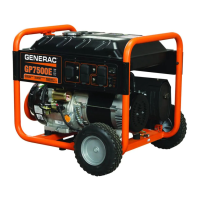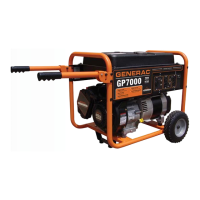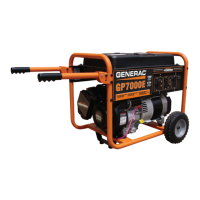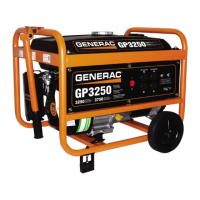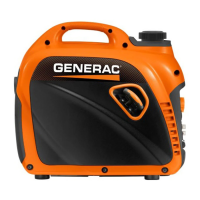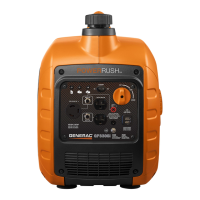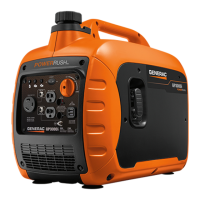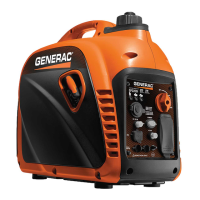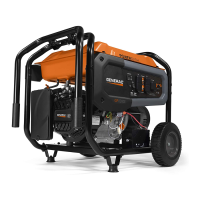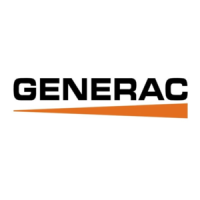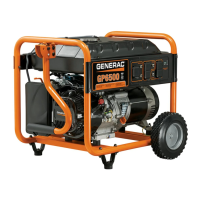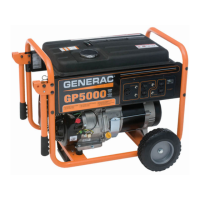ELECTRICALHAZARDS
• The generator produces dangerously high voltage when in
operation.Avoidcontactwith barewires, terminals,connections,
etc., whilethe unitis running,evenon equipmentconnectedto
thegenerator.Ensureall appropriatecovers,guardsandbarriers
are in placebeforeoperatingthe generator.
• Never handle any kind of electrical cord or device while
standingin water,whilebarefootor while handsor feet arewet.
DANGEROUSELECTRICALSHOCKMAY RESULT.
• TheNationalElectricCode(NEC)requiresthe frameandexternal
electrically conductive parts of the generator be properly
connectedto an approvedearth ground.Localelectricalcodes
may also require proper grounding of the generator.Consult
with a localelectricianfor groundingrequirementsin thearea.
• Use a ground fault circuit interrupter in any damp or highly
conductivearea(such as metaldecking or steelwork).
• Do not useworn, bare,frayed or otherwisedamagedelectrical
cord setswith the generator.
• Beforeperforminganymaintenanceonthe generator,disconnect
the engine starting battery (if equipped)to prevent accidental
start up. Disconnectthe cablefrom the battery post indicated
by a NEGATIVE,NEGor (-) first. Reconnectthat cable last.
• In case of accidentcausedby electricshock, immediatelyshut
down the source of electrical power. If this is not possible,
attempt to free the victim from the live conductor. AVOID
DIRECTCONTACTWITH THE VICTIM. Use a non-conducting
implement,such asa ropeor board,to freethevictim from the
live conductor.If the victim is unconscious,applyfirst aid and
getimmediatemedical help.
FIREHAZARDS
• Gasolineis highlyFLAMMABLEanditsvaporsare EXPLOSIVE.
Never permit smoking,open flames, sparksor heat in the
vicinitywhile handlinggasoline.
• Neveraddfuel while unitis runningor hot.Allow engineto cool
completelybeforeaddingfuel.
• Never fill fuel tank indoors, Comply with all laws regulating
storageand handlingof gasoline.
• Do not overfill the fuel tank. Always allow room for fuel
expansion.If tank is over-filled,fuel can overflow onto a hot
engineandcause FIREor an EXPLOSION.Neverstoregenerator
with fuel in tank where gasolinevapors might reachan open
flame, spark or pilot light (as on a furnace, water heateror
clothes dryer). FIREor EXPLOSIONmay result. Allow unit to
cool entirelybeforestorage.
• Wipe up any fuel or oil spills immediately. Ensure that no
combustiblematerialsareleft onor nearthe generator.Keepthe
areasurroundingthe generatorcleanand freefrom debrisand
keepa clearanceof five (5) feet on all sideto allow for proper
ventilationofthe generator.
• Do notinsert objectsthrough unit's cooling slots.
• Never operate the generator if connected electrical devices
overheat,if electricaloutputis lost, if engineor generatorsparks
or ifflames or smokeare observedwhileunit is running.
• Keepafire extinguishernearthe generatoratall times.
STANDARDS/NDEX
1. NationalFireProtectionAssociation(NFPA)70:TheNATIONAL
ELECTRICCODE(NEC)availablefrom www.nfpa.org
2. NationalFire ProtectionAssociation (NFPA)5000: BUILDING
CONSTRUCTIONAND SAFETYCODEavailable from www.
nfpa.org
3. InternationalBuildingCodeavailablefrom www.iccsafe.org
4. Agricultural Wiring Handbookavailablefrom www.rerc.org ,
Rural ElectricityResourceCouncil RO.Box 309 Wilmington,
OH45177=0309
5. ASAEEP-364.2Installationand Maintenanceof FarmStandby
Electric Power available from www.asabe.org, American
Society of Agricultural & Biological Engineers2950 Niles
Road,St. Joseph,MI 49085
This list is not all inclusive.Checkwith theAuthority HavingLocal
Jurisdiction (AHJ)for any localcodes or standardswhich may be
applicableto your jurisdiction.
MODELNO:
SERIALNO:
Unit ID Location
DATA
DECAL
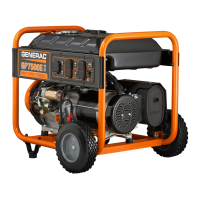
